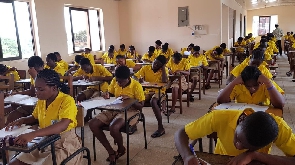The Minority in Parliament has raised concerns about the upcoming 2023 West African Senior School Certificate Examination (WASSCE) and the Basic Education Certificate Examinations (BECE).
They caution that these examinations are under threat unless the government settles all outstanding debts owed to the West African Examinations Council (WAEC).
In a report by citinewsroom.com, Peter Nortsu-Kotoe, the Minority Spokesperson on Education, expressed deep concern over WAEC's urgent need for over GH₵50 million to fulfil its financial obligations and ensure the seamless organization of the upcoming 2023.
He highlighted the current challenges faced by WAEC, citing the government’s failure to release funds for compensating individuals who provided them services during the 2022 WASSCE.
This includes allowances owed to supervisors, invigilators, examiners, and other personnel who were involved in the examination process.
“The challenge for WAEC now is the government’s inability to release funds to them to perform their functions. Those who worked for WAEC last year, 2022, in the conduct of the WASSCE have not been paid the allowances due to the supervisors, the invigilators, the examiners, and all other persons. So, WAEC is unable to raise funds to meet its obligations,” he said.
With the 2023 examinations approaching, WAEC finds itself unable to cover the expenses incurred during the previous year's services.
The minority spokesperson on education said that if swift actions are not taken, teachers and individuals who provided services as supervisors and invigilators may be reluctant to participate again in the future.
“Now the examinations are about to start again, or they have even started with the orals and practicals and the WAEC is not having money to pay for last year’s services. So, we don’t know what the government is doing and if care is not taken, the persons or the teachers who gave us the service may not be ready to provide services again as supervisors and invigilators,” he added.
Drawing attention to the practices in other countries, Nortsu-Koto, questioned why the same cannot be done here in Ghana.
“I know of a country, a member country, that by the end of the first quarter, all the budget of WAEC is released to them for national and international examinations. Why can’t we do the same in Ghana?”
“This is the challenge WAEC is facing and if we don’t help them to get what is due them, I don’t know how the exams for this year will be conducted. For now, they need about GH₵50 million to clear the previous year’s arrears. Those who print their scripts for them, those who print booklets, they owe all of them. So, if you don’t pay, how will they provide those materials for you?”
NW/WA
Watch the latest episode of the Lowdown on GhanaWeb TV below:
You can also watch the newest episode of Legal Agenda on GhanaWeb TV below:
Share your news stories and ideas with GhanaWeb

To advertise with GhanaWeb

General News of Thursday, 27 July 2023
Source: www.ghanaweb.com

















